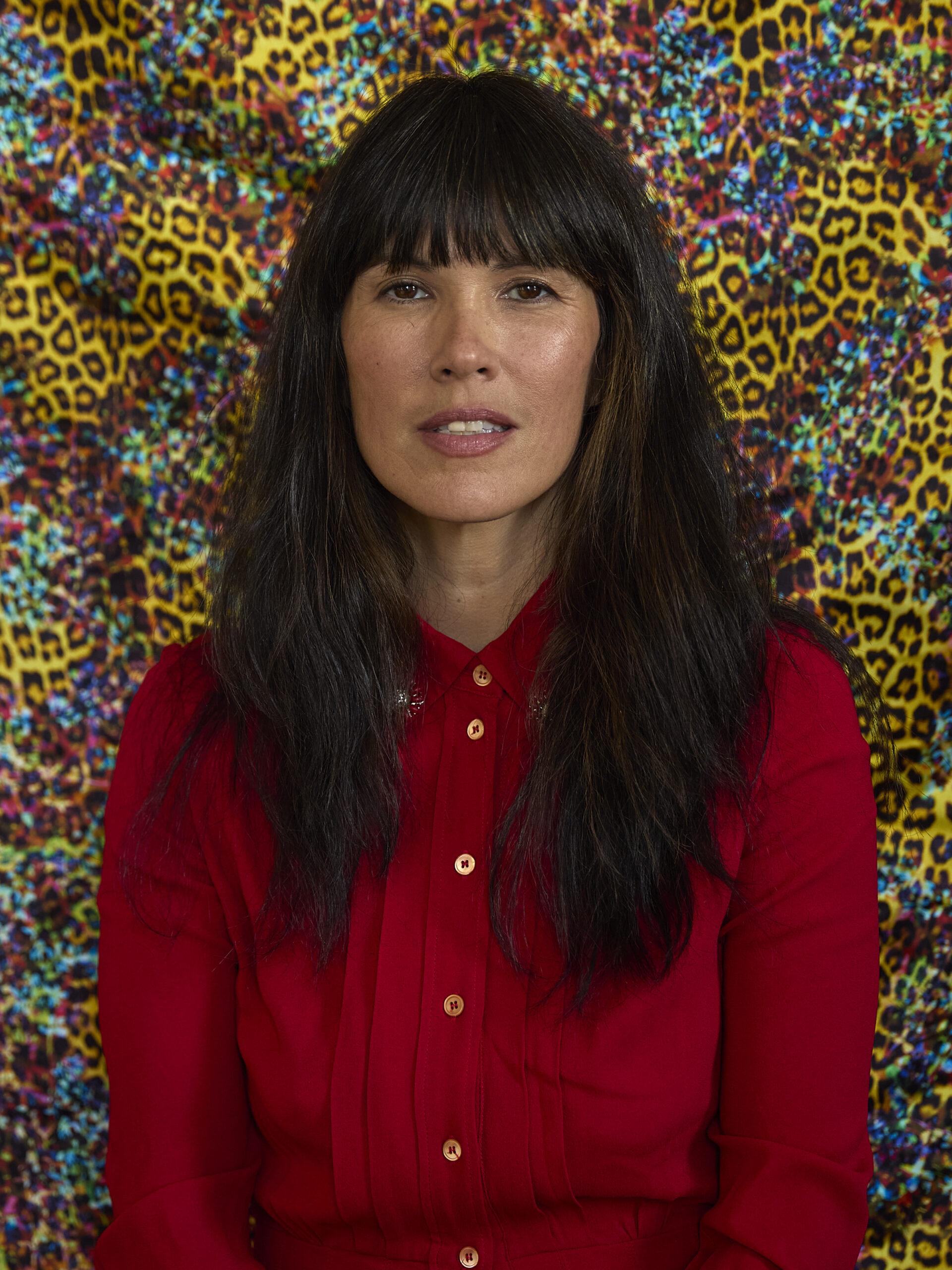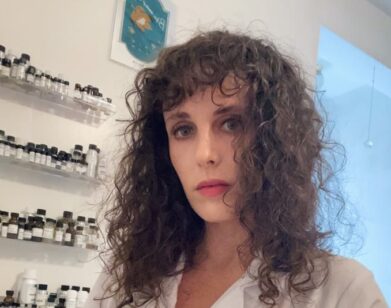SHRINK
“This Is Freud’s Wet Dream”: Jamieson Webster on Whale Pods, Mass Anxiety, and Nasal Menstruation
In today’s world, it often seems as though there are more psychotherapies than actual psychological disorders. From CBT to equine therapy to primal scream therapy, options for the 21st-century breather are vast. But Jamieson Webster’s latest book, On Breathing, brings us back to the foundational tenet of psychoanalysis: say anything. (Enter a swarm of anxieties, amnesias, and a thousand possibilities.) “Desire is not the same as aliveness,” writes Webster, a psychoanalyst with a private practice in New York City whose many books—including Disorganization & Sex and Conversion Disorder: Listening to the Body in Psychoanalysis—have revitalized the field and made it more relevant, poignant, and thought-provoking than ever.
I have 492 voice memos on my phone—recordings of dreams spanning 12 years of psychoanalysis, nearly the same amount of time I’ve known Webster. It felt natural to record notes on her book in this manner, using just my voice. On Breathing explores the fragility of raw speech in a world where speaking and listening to one another has become increasingly complicated. Throughout, Webster demonstrates a sharp understanding of how profoundly our relationship to the atmosphere shapes how we take in life.
Our conversations over the years have run the gamut from Freud’s theory of nasal menstruation to perfume and amnesia, each exchange deepening my appreciation of her insight and reminding me how her work directly enriches mine. While writing On Breathing, Jamieson once told me about “Breathing,” the song by Kate Bush. And though her musings on the track didn’t make the book’s final cut, I’ll tee up our conversation below with its lyrics: Outside / Gets inside, ooh-ooh-ooh… / Breathing / Breathing my mother in / Breathing my beloved in / Breathing, breathing her nicotine / Breathing / Breathing the fall-out in, out in, out in, out in, out in…
———
MARISSA ZAPPAS: How’s Jamaica?
JAMIESON WEBSTER: It’s really nice. How’s Gogo?
ZAPPAS: He’s very oral. Eating and barking a lot. I was laughing earlier because I was experiencing the exact anxiety that you mention in your book around having actual conversations.
WEBSTER: That’s a terrible anxiety.
ZAPPAS: And I’m having it. Oh, well! I really felt like your book weaved an astonishing amount of material related to breath into something both profound and accessible. I love how you encourage courage in the face of all this collective anxiety and destruction. Reading this reminded me of the real alchemy of breath and it made me wonder, what was the alchemy in actually writing this?
WEBSTER: That’s a good question. It was really written in a fugue state. There was early material in five incomprehensible Google Docs, and then it became the book. I had an editor who let me do whatever, but held my hand and was there with me, which was less lonely and crazy than you become if you’re holding all this material. I got really scared that I was going to sound like some sort of wellness person, so I was on the hunt for the weirdness of breath for a long time. And I found it, I think.
ZAPPAS: You did a good job of not necessarily throwing the baby out with the bathwater in terms of what yoga and wellness do offer us. I am struggling with this conversation thing, by the way.
WEBSTER: But this is what happens, because breathing is weird, so speaking is weird, so then you start to not know how to even have a conversation anymore, which is where the book ends. It ends with the impossibility of speaking. And obviously, that’s what we have to do if we’re going to get out of this authoritarian takeover that we’re in. We have to figure out how to talk to each other.
ZAPPAS: I’m glad we’re doing that, then. You touched on the deep collective confusion of this moment, how it shapes how we communicate. Things have never been more unclear. I think about this often because scent confuses. You write that it’s sometimes easier to confront death than the anxiety and confusion of sickness, describing your experience in the ICU during the pandemic as well as your father’s passing. Both reflect this idea of choosing death over a prolonged illness. But it can also go the other way: we make ourselves sick to avoid death. Could you talk about this conundrum?
WEBSTER: It started in the hospital where I was going to confront this mass death and do palliative care work. And then I realized that what everybody hated was less the question of death, but the ambiguity of whether you were spreading sickness, whether we were making each other sick. I kind of liked being in the ICU because I wanted to get away from sick people, and that was the revelation, that I was as much deluded as the rest of us. Psychoanalysis always wants to strip back the illusion, but you can never quite get there. That was Freud’s point. So it was a kind of foray into that.
ZAPPAS: Is there always an illusion?
WEBSTER: I think for him there is, because you are always within a conscious framework, which is partly imaginary, so you don’t ever get outside of it. You just learn how to live with it a little better. And his followers, [Sándor] Ferenczi and Otto Rank, all the breath explorers and anxiety explorers, wanted to rip open the box. There’s a moment when Freud was like, “All of you, just stop,” and he got really angry about it. Mind you, there were moments when I was like, “Wow, this guy’s really mean.” And I hadn’t really experienced that with Freud before, but somehow did in this historical investigation into breath. But at the end of the day, the whole issue was that he felt “you can’t raid the lock box.” You’re not going to reach the bottom. The bottom’s always a false bottom. And Wilhelm Reich was the biggest offender.
ZAPPAS: I loved him.
WEBSTER: I know you love him, but he was a terrible guru. I love Kate Bush more than him.
ZAPPAS: Of course. I just found that whole passage to be really entertaining and incredibly relevant. It seems like we’ve somehow gone back to him.
WEBSTER: I think so, yeah.
ZAPPAS: I also loved the [Sándor] Ferenczi references, the way he described his patient’s hypochondria like a cobweb she wanted to tear. You write that phobias create boundaries, reorganizing the web and leaving bigger spaces in which to breathe. Can you explain the idea that anxiety is the denial of death? I think this is so important.
WEBSTER: Freud was really worried about anxiety because he said it just blankets you like the cobweb. You can’t see anything else but the anxiety, and the anxiety wants to master death, which can’t be mastered. It wants to find safety and a protective net. This is why you have to have the calmest voice imaginable. The monotone “there will be no problems” voice. But anxiety will make you sick and crazy, and it needs solutions on the outside. CBT and breathing therapies are really aimed at excessive anxiety. But hysterical and bodily symptoms concentrate the anxiety in a verbal, embodied expression, and that’s manageable. It’s like when Ferenczi talks about poking a hole in the cobweb that you can use to breathe and to live. I think Freud also thought that anxiety can’t be a therapy problem, it’s a society problem. If we’re creating a world that has too much anxiety, then we’re in really big trouble. And I think we’re at that moment. All anyone talks about right now is how anxious they are.
ZAPPAS: And my experience in 19 years of psychoanalysis is that it helps with a lot of things, but not anxiety, at least not in the short term. Okay, let’s move to animals. Why do you think breath and animals are so intertwined? There were so many animals in your book.
WEBSTER: There’s birds, there’s puppies.
ZAPPAS: Spiders, whales, dolphins, even a dead hamster.
WEBSTER: There should really be more plants, unfortunately, but I just kept coming across animals. The story of childhood breathing is the question of what it means to feel alive. I really love whale songs because, one, they’re the species that went back to the sea. They crawled out and had to breathe and sexually reproduce on land, which is terrible and friction-filled, and the dream of fluidity was crawling back into the sea. And our obsession with their singing, and their sort of three-dimensional noise-making, and their defunctionalized noses, it sort of became a question of, “What happens to us humans? Is our incapacity to smell going to become some amazing 3D sonic system?” The pods are traversing the earth and singing these songs and sending them to each other. So they pick up the parts of the other whales’ songs and complexify them. And then at some point, they erase them and start over again. I just found this so beautiful.
ZAPPAS: I would love to know why.
WEBSTER: I would too. This is why people have given $33 million to the new AI whale language initiative to finally decode their language. We’ve been trying to decode it forever. I don’t think we’re going to get very far.
ZAPPAS: I also was really intrigued by the bit about sirens, which felt totally related to the whales. But they’re not animals.
WEBSTER: They’re women. And there’s a certain moment in which the breathing, the speaking, the smells of women are something that society wants to get rid of, or maybe it wants to bottle it and fetishize it or something. But in ancient Greek society, I loved that the sounds that women make that were horrifying and world-destroying, and they had a word, ololyga. It’s basically onomatopoeia. And in ancient Greek society, these sounds could not be made in public. So a woman’s grief, a woman’s pleasure, a woman’s pain had to be cordoned off, especially from men who had to go into battle and kill other people because it would take away their power to kill.
ZAPPAS: Wow. I suppose I’m in the business of bottling and fetishizing it.
WEBSTER: Or remembering!
ZAPPAS: Unrelated, but the anecdote about how kids in mindfulness classes often experienced more anxiety rings so true. You suggest it helps not to listen to yourself speak, but how does one do that?
WEBSTER: The key to all of this is repression, actually. We don’t notice when we start holding our breath, for example, but there’s some repressive mechanism there. And it seems related to the fact that every time that there’s a discovery around breathing and what it can cure, it’s forgotten. That’s been the case over thousands of years. James Nestor, in his book on breath, calls them Pulmonauts, these people who teach themselves the curative ideas about breathing. They’re always forgotten. Anxiety in psychoanalysis also needs repression to take a portion of it away so that it’s not all encompassing. And with the voice, this is also true; we repress some aspect of speech. If we listen to ourselves speak, we’d go crazy. If we started to hear it just as noises like when we smoke too much pot, we’d go crazy. It’s what happens to psychotic people. They hear voices, which is essentially them hearing their voice from the outside. It’s really fun to get back behind the repression a little bit so you can tamper with the machine.
ZAPPAS: Like, it’s fun to be crazy?
WEBSTER: Yeah. Even with the breathing, it’s fun to pay attention to it a little bit. It’s what you do in yoga. You start to mess around with it a bit.
ZAPPAS: Right. I guess I sometimes don’t know where the line is between having that awareness calm me down and having it amp me up.
WEBSTER: It’s a tough thing to gauge, isn’t it?
ZAPPAS: It really is. You mentioned how modern yoga and psychoanalysis were both developed during the excess loss of wartime. Do you think there’s a salve for today’s collective grief? It’s like the normal salves aren’t hitting as hard for people these days or something.
WEBSTER: No, they’re not. I wish I had answers. I have no answers. I really like [DW] Winnicott, who became a kind of underground hero in the book. People think of him as the nice child psychoanalyst, but he’s really weird when you actually read him. Like, he says, “I don’t know what a mind is. I think some people have them, but it’s a kind of mistake.” Because for him, everything is just psyche-soma. Even knowledge for him is a symptomatic mistake. It’s some precocious attempt to get ahead of impingements from the world. You’re like, “Well, if I understand it, then I can make it stop.” But that’s slightly delusional and it’s a trauma response. He said the most traumatized people are the most precociously intelligent, and while it might get them certain places, it will never help them with just being in the world. And it seems really hard at this moment when we do feel incredibly under threat to advocate for just being. It feels wrong, but at the same time there is something very important in it. If we’re going to figure anything out, it’s not going to be from the place of just utter threat or an illusion of mastery.
ZAPPAS: You’re inspiring me to buy a ticket to Jamaica.
WEBSTER: Come to Jamaica. Wait, I have a crazy memory. Do you remember that movie with Daryl Hannah and Dudley Moore called Crazy People?
ZAPPAS: No, I never saw it.
WEBSTER: They go to a mental institution and then the people there write advertisements and they’re actually the best advertisement writers because they can only tell the truth. They changed the national Jamaica ad to, not “Come to Jamaica,” but “Come in Jamaica.”
ZAPPAS: God, that’s amazing.
WEBSTER: It’s very funny. I love that movie.
ZAPPAS: Maybe I’ll watch it tonight with my puppy if he stops barking at the TV. Okay, you also talk a lot about amnesia in this book and how, as Luce Irigaray says, “The forgetting of air is deeply tied to an erasure of the feminine.” Both psychoanalysis and smell pry open our amnesias. I remember a long time ago you said to me that perfume was something to be forgotten and then remembered again, which I think about constantly. In this book, you write that losing our home within our mothers leads to sexism and the forgetting of what we share: a “constellation of forgetting.” Perfume reminds us of our mothers too. I was all over this specific chapter.
WEBSTER: It’s a connection to some sort of forgotten ancestral past. And this is very important for Freud because our evolution has made it such that we don’t smell the way that we could have when we were animals. And yet, there’s the vestige of all of this history in breathing and smell. They’re all using the same passageways. I think I told you on some other occasion, but the only erectile tissue on the body besides the nipples and the genitals is in the nose. So there’s this inherent excitability and a directness in the sensation of smell that’s unlike any of the other senses. Freud even calls it the center of an aesthetic awareness because it’s like, the excitement would be unconsciously triggered before it leads into the conscious memories. This is Freud’s wet dream, that the nose goes to the heart of it, and then consciousness has to catch up. It’s what he’s always looking for, which is also the case with dreams because dreams form themselves without conscious awareness and then you have to catch up to your dream. Part of his backstory was his mentor, who thought that you could find the men’s menstrual cycle in their nose.
ZAPPAS: I feel like my nose is always swollen because I basically live in a perfume lab, so maybe I have a permanent nasal erection.
WEBSTER: He always reminds us that there are certain people who retain their capacity for smell. He always brings it up.
ZAPPAS: I definitely have. And I notice that my nasal passages are only clear around when I’m ovulating. When I’m bleeding, I can’t smell at all. It’s strange.
WEBSTER: The menstruation out of the nose and the surgeries to cure hysteria in the nose, it’s all a bit mad, but they also weren’t wrong. And we now know that the nose cycles left-right, and they knew that in ancient eastern philosophies. But he and [Wilhelm] Fliess were trying to figure this out, and they knew it somehow. It’s the same way in which we keep trying to catch up to the breathing knowledge.
ZAPPAS: I also really love the Ingeborg Bachmann quote about psychoanalysis and poetry, how both embrace and even rely on the ephemerality of language. Psychoanalysis can be perceived as conservative and highly intellectual, which I guess it is, but I find it to be sort of absurd and goofy. I often try to convince my friends to do psychoanalysis. And then when they do, they’re like, “I don’t know what I’m supposed to be doing.” Your book really clarified that the rule is there’s no rule. You could literally just say “frog” and that could be the session.
WEBSTER: That would be the best session ever.
ZAPPAS: There’s something to be said about tadpoles. There’s something to be said about everything. And—
WEBSTER: The frog is the figure in Ferenczi, right? Because it’s the one in between. You were a fish, then you were a frog, and then you were a monkey. And we get the hiccups because we still have the vestige of the frog in us, since they close the flap between going in the water and breathing in air. We can’t breathe underwater, but we still have the stupid hiccup for the flap that doesn’t work.
ZAPPAS: My puppy gets the hiccups too. I also want to mention the bit about the tyranny of the visual and questioning whether or not there’s any truth in what we see. I always find it funny that my training to be a perfumer—memorizing all the raw materials, “blind smelling” is what it’s called—coincided with my second analysis. I was just so confused, so regressed. You probably remember how my allergies were insane. Sometimes I feel like I permanently exist in this confused, disoriented state just because I’m always smelling.
WEBSTER: But it probably helps you get out of the visual, which we’re all having a lot of trouble with. And I really appreciate that in yoga, you’re trying to not use your eyes to balance yourself, which we do. Or when you meditate, you’re supposed to have your eyes at half-mast. It’s not that seeing can’t be incredibly exciting, but I think that there’s a trap. We defunctionalized our noses at the moment in which we could see in color, and this is what Freud was worried about. Doesn’t civilization seem like it’s going in the other direction?
ZAPPAS: Completely, which is why I really appreciated your book. It felt like a callback to chaos.
WEBSTER: It’s chaos. There is something about learning to live in chaos, and anxiety just creates more chaos, so we really need every strategy at our disposal. I have this performance artist coming to Pioneer Works, Andros Zins-Browne, and he does something called The Chaos Opera where you sing together, but without singing the same song, which is very hard to do. But it felt like the perfect accompaniment to the book.
ZAPPAS: It was really striking how poetic this book is. I’ve never read anything of yours that was so poetic, actually. I felt like each chapter ended on just the most exquisite lines, and I wish I could read all of them out loud right now.
WEBSTER: Thank you. I needed language to be a big part of it. With climate catastrophe and all the problems we have, I needed the question of language and poetry to come to the foreground. We forget that that’s air, and we forget that that’s also breathing.
ZAPPAS: It seems like the only way out, actually.






